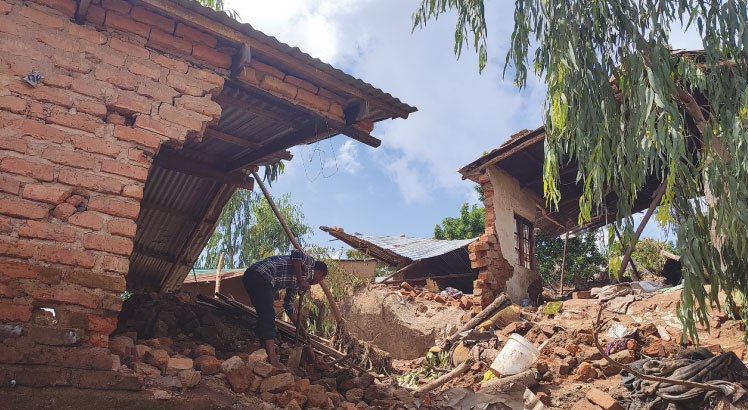Cyclone a wake-upcall on climate crisis
People started running, so we ran,” says Eliza Edward, a farmer who lost her husband to massive floods triggered by Cyclone Freddy in Malawi last month.
She was forced to flee her home at the foot of Soche Hill, south of the country’s commercial capital, Blantyre.
After lashing other parts of Southern Africa in February, including Mozambique and Madagascar, the world’s longest-lasting cyclone returned to the region with a vengeance.
It triggered torrential rains that led to flooding, mudslides and massive devastation in the Southern Region of Malawi.
In just six days, it dumped the rainfall equivalent to half an average rainy season for that region. It has also worsened cholera outbreaks in the country and neighbouring Mozambique.

“We did not manage to take any food or clothes. We just managed to save our lives,” Edward says.
Sure to deepen hunger in the region, Freddy reflects the dangers of intense weather events that are likely to become worse with climate change.
Malawi is among the least responsible for the climate crisis, but they are feeling some of its worst effects.
“The destruction and suffering that I witnessed in southern Malawi is the human face of the global climate crisis,” says United Nations Resident Coordinator for Malawi, Rebecca Adda-Dontoh. “The people I met with—many of whom have lost their homes and loved ones—have done nothing to cause this climate crisis.”
Blantyre resident Alex Mattias, who works as a housekeeper, is one of them.
“The first wave was water sweeping down the hill. But the second came with a mudslide which had rocks and trees,” he recalls of the deluge that destroyed his home and livelihood. “
Mattias hopes that more support will keep coming because “the survivors are just too many”.
“Life is hard, especially for young children,” he says.
In Mozambique, too, Cyclone Freddy’s second landfall has left a trail of destruction, affecting livelihoods, houses and infrastructure.
Meteorologists say it’s the longest-lasting and most-travelled tropical cyclone on record.
The Department of Disaster Management Affairs estimates that the cyclone displaced more than 660 000 people currently living in 747 makeshift camps. The disaster has claimed 676 lives, with 533 missing and 1 332 injured.
The World Food Programme (WFP) and its partners are working flat out to ensure food and other essentials reach cyclone survivors whose lives have been turned upside down while continuing to support search-and-rescue operations.
In the hard-hit Nsanje district at the southern tip of Malawi, for example, WFP-provided boats have helped the government rescue hundreds of people.
“The rain started around midnight while we were sleeping,” recalls farmer Mervis Soko, who lives in another cyclone-hit area. “When we realised the water was entering the house, we started taking our children out one by one. We did not manage to take any food or clothes. We just managed to save our lives.”
Floodwaters also destroyed the family’s crops.
“There is nothing we can go back to harvest,” Soko says. “Today, because of WFP food we received, we know we will eat, but we are very desperate about our future.”
Even before Freddy hit, many in Malawi were already living on the edge. Experts estimate more than 3.8 million people—20 percent of the population —needed food assistance during the October-to-March lean season.
In cyclone-affected regions, the price of maize, a staple, has skyrocketed to record levels. On average, the grain is 300 percent higher than at this time last year.
In Nsanje, cut off from the rest of the country for two weeks by floodwaters, maize prices are even higher.
“The country will need significant support,” says Paul Turnbull, WFP country representative in Malawi, in what will be “a very difficult year for many.
“The level of devastation we are dealing with here is greater than the resources we have at our disposal,” he adds.
A number of cyclone survivors interviewed put the mudslides triggered by Freddy down to the mythical Napolo, a snake said to live in the belly of the mountains.
Experts predict ever-intense storms and other extreme weather events in the years to come.
“It is critical that the international community steps up,” says WFP’s Turnbull. “It is a call to the world not to turn away from the climate crisis.”
WFP requires at least $27 million over three months to provide food assistance to 500,000 people hit by the cyclone, including those displaced and schoolchildren – and to offer logistics support to Malawi’s Government and partners.





